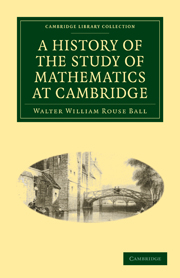Book contents
- Frontmatter
- PREFACE
- Contents
- Chapter I Mediæval mathematics
- Chapter II The mathematics of the renaissance
- Chapter III The commencement of modern mathematics
- Chapter IV The life and works of Newton
- Chapter V The rise of the Newtonian school
- Chapter VI The later Newtonian school
- Chapter VII The analytical school
- Chapter VIII The organization and subjects of education
- Chapter IX The exercises in the schools
- Chapter X The mathematical tripos
- Chapter XI Outlines of the history of the university
- INDEX
Chapter V - The rise of the Newtonian school
Published online by Cambridge University Press: 07 September 2010
- Frontmatter
- PREFACE
- Contents
- Chapter I Mediæval mathematics
- Chapter II The mathematics of the renaissance
- Chapter III The commencement of modern mathematics
- Chapter IV The life and works of Newton
- Chapter V The rise of the Newtonian school
- Chapter VI The later Newtonian school
- Chapter VII The analytical school
- Chapter VIII The organization and subjects of education
- Chapter IX The exercises in the schools
- Chapter X The mathematical tripos
- Chapter XI Outlines of the history of the university
- INDEX
Summary
In the last chapter I enumerated very briefly the more important discoveries of Newton, and pointed out the four subjects to which he paid special attention. I have now to describe how those discoveries affected the study of mathematics in the university, and led to the rise of the Newtonian school.
The mathematical school in the university prior to Newton's time contained several distinguished men, but in point of numbers it was not large. We need not therefore be surprised to find that it was Newton's theory of the universe and not his mathematics that excited most attention in the university; and it was because mathematics supplied the key to that theory that it began to be studied so eagerly. Hence the rise of the Newtonian school dates from the publication of the Principia.
In considering the history of this school, it must be remembered that at Cambridge until recently professors only rarely put themselves into contact with or adapted their lectures for the bulk of the students in their own department. Accordingly if we desire to find to whom the spread of a general study of the Newtonian philosophy was immediately due, we must look not to Newton's lectures or writings, but among those proctors, moderators, or college tutors, who had accepted his doctrines. The form in which the Principia was cast, its extreme conciseness, the absence of all illustrations, and the immense interval between the abilities of Newton and those of his contemporaries combined to delay the acceptance of the new philosophy ; and it is a matter of surprise that its truth was so soon recognized.
- Type
- Chapter
- Information
- A History of the Study of Mathematics at Cambridge , pp. 74 - 96Publisher: Cambridge University PressPrint publication year: 2009First published in: 1889



